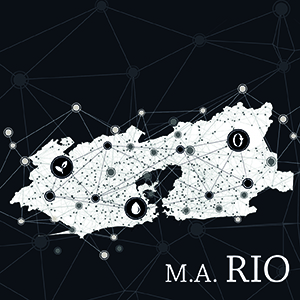 The project aims to provide an innovative planning strategy suitable to different degree of governance, on the basis of the analysis of Rio de Janeiro at the metropolitan scale. The selected site of study is the area of Tinguà, in the region of Nuova Iguaçu, which provides to the city of Rio a large part of the water supply, thus it’s not included to its municipality and therefore lacks both infrastructures and services. The methodology focuses on the interpretation of the geographical
The project aims to provide an innovative planning strategy suitable to different degree of governance, on the basis of the analysis of Rio de Janeiro at the metropolitan scale. The selected site of study is the area of Tinguà, in the region of Nuova Iguaçu, which provides to the city of Rio a large part of the water supply, thus it’s not included to its municipality and therefore lacks both infrastructures and services. The methodology focuses on the interpretation of the geographical
food and water system with the aim of ensuring a sustainable use of these resources to enhance peripheral living conditions.
The fundamental concept of the design is the recognition of family agriculture as a key-figure in social and economic dynamics of rural areas. The proposed strategy is based on on a circular economy model able to develop this informal agricultural economy in a metropolitan tool for the preservation of natural and social resources through a minimal impact project adopting an acupuncture approach. The first planning tool of this project is the creation of a cartographic database, linking the water and food systems to metropolitan indicators, to allow the identification of existing or latent landscape patterns.
Once identified the local values through these patterns, the proposed solution wants to elaborate them into a newly developed economic system based on family agriculture. Such model creates a circular economy based on a well designed network of small but focused interventions, identified as hotspots. The logic of the hotspot, is that of an “incubator of possibilities” which works not only as an immediate response to specific needs on a local area, but also as a generator for value for the metropolitan scale able to link rural and urban areas, implementing the system within its logic of valorisation of cultural identity. In addition, the strength of the hotspots is to recreate a pattern able to link Rio city, to the Mega Rio area establishing a relationship between rural and urban realities where Tinguà becomes the local element of the acupuncture chart, restorable in the other valleys, able to unite and integrate intercalary metropolitan projects.
Principal Academic Tutor
Antonella Contin, Dipartimento di Architettura e Studi Urbani, Politecnico di Milano
Academic Tutors
Francesca De Filippi, Dipartimento di Architettura e Design, Politecnico di Torino
Giancarlo Vecchi, MIP-Politecnico di Milano
Pedro Ortiz, Multilateral Consultant _ MSLab (Dastu)
Aldo Treville, PhD_Environmental Assessment and Planning Consultant, MSLab_Dastu
Alessandro Frigerio, PhD_MSLab_Dastu
External institutions
Conservation International Brazil
Economia e Sostenibilità (EStà)
Municipality of Nova Iguaçu
OndaVerde
Pontifical Catholic University of Rio de Janeiro (PUC-Rio)
Team members
Floriana Acconcia, Progettazione Architettonica, Politecnico di Milano
Irene Sofia Ceron, Architettura, Politecnico di Milano
Benedetta Gatti, Architettura, Politecnico di Milano
Bianca Gentili, Architettura, Politecnico di Milano
Melissa Latella [Team Controller], Ingegneria per L’ambiente e il Territorio, Politecnico di Torino
Simone Mazzero Architettura Costruzione Città, Politecnico di Torino
Download the poster of the Project
Watch the video of the Project
